

A visit to Boxford (Suffolk) Farms at Stoke by Nayland in Essex with The Essex & Suffolk Fruit Growers Society
On Thursday (16th July) The English Apple Man joined his East Anglian friends for a visit to Boxford (Suffolk) Farms; Boxford has been in the 'Peake' family since the late Devora joined her husband Bill Peake in an 'adventure' which has spanned more than seven decades.
Peake Fruit Ltd. a first class fruit growing, storing, packing and marketing company - is a subsidiary of The Boxford Group, a family owned business founded by Bill and Devora Peake. The Peake family have been producing top quality fruit in East Anglia for the last 60 years. From a small 120 acre apple farm, the Peake's entrepreneurial skills have developed a thriving and diverse group of companies which have grown to include golf, leisure and fruit processing businesses on 900 acres of land.
Click to view the history behind Peake Fruit Ltd
Before our tour of Boxford (Suffolk) Farms, we gathered at The Stoke by Nayland Club for afternoon tea. Hosting the E&SFGS visit; Robert England - Farms Director for Boxford (Suffolk) Farms. Also in attendance Susannah Rendall - Group Managing Director and her sister Carmella Meyer - Executive Director Boxford (Suffolk) Farms (daughters of Bill and Devora Peake).
Click on Stoke by Nayland Golf Club to see the full spectrum of Golf, Hotel and Restaurant facilities.
Boxford (Suffolk) Farms have been growing Fruit on the Suffolk and Essex border for more than 70 years. The business itself started trading in 1938 and has been involved in many types of farming over the years such as arable, organic, fruit and livestock.
Today - the family business extends to more than 950 acres. The Golf Course covers 350 acres, Apples 270 acres, Soft Fruit 100 acres, Arable (Maize) 110 acres (includes 35 rented) and 155 acres of Woodland and Environmental Options.
Ancient and Modern
Boxford is a fantastic opportunity to compare 'ancient and modern' with Bush Trees the 'dominant' system from 'post war' through until the 1970/80's before Spindle trees became 'the norm' until the new Millenium when intensive Single rows became the 'vogue' for progressive growers. The 'twin stem' Bibaum is the next progression (but not yet in vogue for many large growers) and Boxford is an industry leader in the 'latest' transformation.
The orchards have changed dramatically over the last decade as older more traditional systems have been gradually replaced with 'state of the art' intensive orchards, and over the last four years investment in Bibaum (twin leader trees) developed by Mazzoni in Italy.
The first Bibaum orchard at Boxford was planted in 2012 and is now in its 4th leaf; the plant density is 3,700 trees per hectare with Gala, Early Windsor and 5 Malus types (pollinators) included. The 'trellis' support system utilizes wooden stakes and wires with cross wires to add stability. Bibaum, due to its propensity to produce less vegetative growth requires less pruning than less intensive systems. It is; as Robert England said - all about 'profit' per hectare rather than purely yield comparisons.
Below: A glimpse of Bibaum at Boxford under hail netting which covers 50 hectares of the most intensive apples
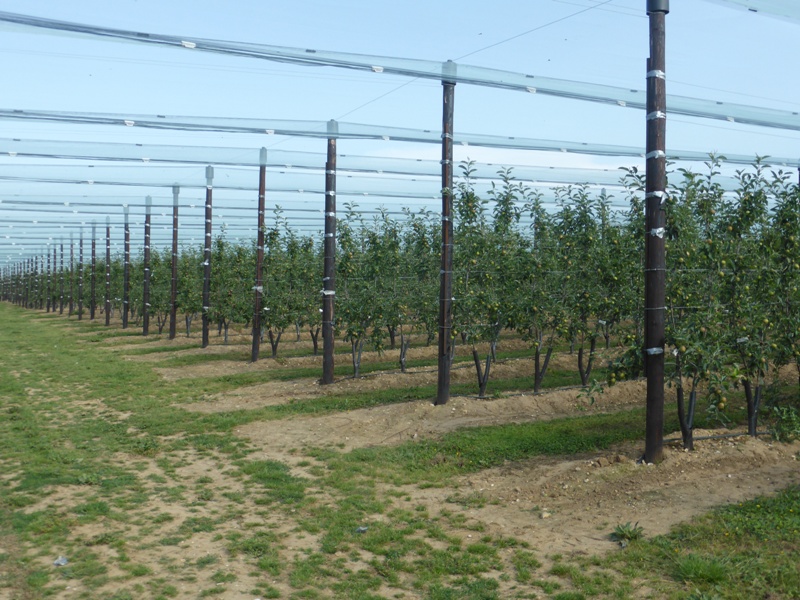
The Bibaum was of particular interest to E&SFGS Members with plantings of both Apple and Cherry; some of the first twin stems to be planted in the UK are now in full production and being fed and watered by an Autoagranom irrigation system.
Below: A passage from Autoagronom website...
"Autoagronom's systems sample and monitor, in real-time, the chemical and physical changes in the upper levels of the root zone. Using various sensors (tensiometers, oxygen, pH and conductivity, and Nitrate calculations) each system collects data from the soil; performs computerized analysis; and, by utilizing fuzzy-control algorithms, automatically activates irrigation and fertilization".
Below: the 'twin stems' of a Bibaum tree - and the Autoagronom controls
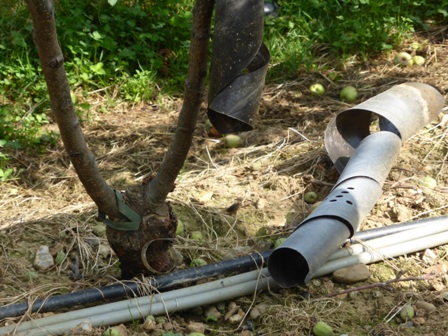
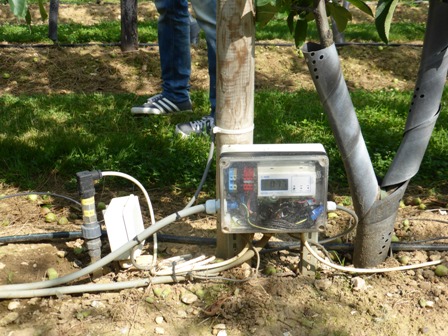
In addition to the precision 'fertigation' system, another piece of technology is used to monitor the growth of an apple on an 'ongoing basis' - clever stuff the Phyto-sensor - F1MM as in some cases, the fruit may lose water that is manifested in deceleration of growth rate or even shrinkage of the fruit. It may be a result of water stress, lack of light, or another limiting factor (quote from website) or as Robert put it; fruit may grow by a millimetre in the day, but lose 1/2 a mill overnight.
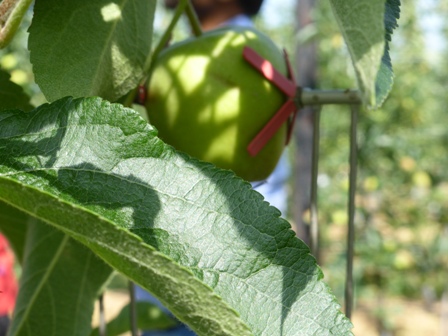
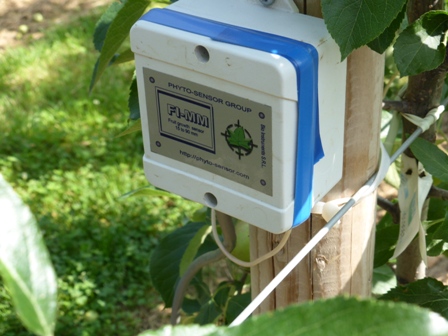
Click to visit Autoagronom website for more information.
Below: Essex & Suffolk Fruit Growers gather at Boxford on Thursday - Bibaum trees under hail netting
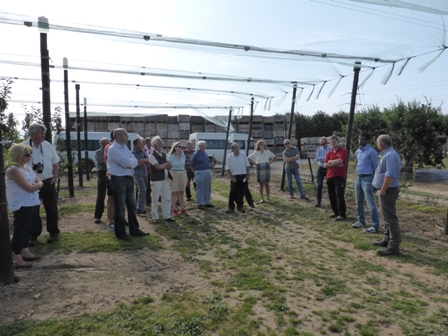
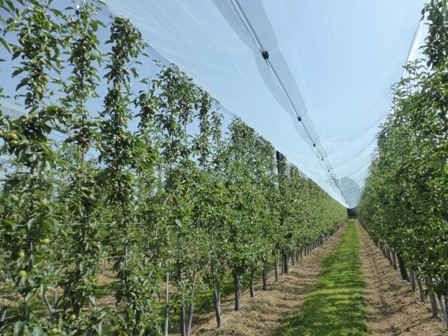
Pruning
Comparing farm data for traditional Bush trees, Spindle trees, Trellis Single Stem trees and Trellis Bibaum trees (all of which are grown at Boxford, the pruning costs per tonne are: Bush £48.86 per tonne - £342 per ha. Spindle £30.21 per tonne - £423 per ha. Trellis Single Stem £16.60 per tonne - £747 per ha. Trellis Bibaum £9.40 per tonne - £335 per ha.
Yields
Yield comparisons speak for themselves;
Old Bush Trees = 5 - 14 tonnes per hectare;
Spindle trees = 10 - 18 tonnes per hectare;
New Trellis Orchards = 45 - 70 tonnes per hectare.
System Comparisons
Monroes Main Planted 1948; 434 trees per ha; Varieties - Cox, Discovery, Worcester, Laxton Fortune; 2014 yield 12.5 tonnes per ha.
Topcroft Planted 2005; Density 4166 trees per ha; Varieties - Braeburn, Gala, Ida Red; 2014 yield 72.18 tonnes per ha.
SRG 1 - Single Stem Planted 2012; Density 3,700 trees per ha; Varieties - Gala, Early Windsor, Malus (5 types); 2014 yield 28.41 tonnes per ha.
SRG 2 - Bibaum Planted 2012; Density 3,700 trees per ha; Varieties - Gala, Early Windsor, Malus (5 types); 2014 yield 37.42 tonnes per ha.
SRG 3 - Bibaum Planted 2013; Density 3,700 trees per ha; Varieties - Gala, Fuji, Golden Delicious, Cheerfull Gold; 2014 yield 15.22 tonnes per ha.
Monroes 'Young Gala' Planted 2013; Density 3,700 trees per ha; Varieties - Gala, Fuji, Golden Delicious, Cheerfull Gold; 2014 yield 16.57 tonnes per ha.
Agronomy
Like all growers, Boxford meets the challenges of pests where necessary with IPM (Integrated Pest Management) principles which inevitably requires some use of approved pesticides, however beneficial insects (Typhs, Lacewings, Ladybirds, Earwigs, and Anthocorids ) are part and parcel of environmentally friendly pest control.
Below: A Bibaum orchard at Boxford and a 'library picture' of the Bibaum prior to harvest in 2014

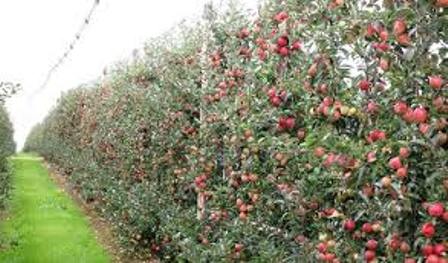
The English Apple Man Comments
The challenges facing UK growers in today's Global Marketplace go way beyond producing apples of high quality at a competitive price; being a custodian of the countryside - 'which growers naturally embrace', after all it's where they live; goes a long way beyond being environmentally responsible - detailed record keeping and regular audits are part of the requirement for supply.
Boxford (Suffolk) Farms is fully compliant with Agri Environment /Assurance Schemes
Assured Produce, Red Tractor, LEAF Marque Accredited, Tesco's Natures Choice 'Gold Standard'
Agri- Environmental Schemes ELS & HLS = (Entry Level (ELS) and Higher Level (HLS).
That's all for this week.........next week, The Journal will cover the Bibaum Cherries at Boxford and the Anaerobic digestion plant installed by Boxford
Take care
The English Apple Man